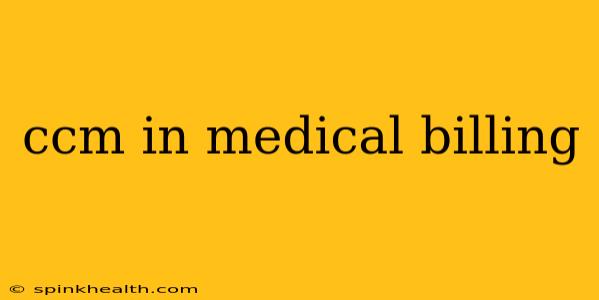Cracking the Code: Understanding CCM in Medical Billing
The world of medical billing can feel like navigating a dense jungle, filled with cryptic codes and complex regulations. One such code, often encountered by healthcare providers, is CCM – and understanding it is crucial for accurate billing and reimbursement. This isn't just about numbers; it's about ensuring you're fairly compensated for the comprehensive care you provide to your patients. Let's unravel the mystery of CCM in medical billing together.
This journey begins with the understanding that CCM stands for Chronic Care Management. It's a specific service offered by healthcare professionals to patients with two or more chronic conditions expected to last at least 12 months, or until the patient's death. Think of it as proactive, ongoing care designed to prevent hospitalizations and manage the patient's overall health effectively.
What are the requirements for billing CCM?
This is a critical question, as meeting these requirements is the cornerstone of successful CCM billing. The Centers for Medicare & Medicaid Services (CMS) have established clear guidelines:
-
Multiple Chronic Conditions: The patient must have at least two chronic conditions, and these conditions must be expected to last at least 12 months or until death. Examples include diabetes, hypertension, heart failure, chronic obstructive pulmonary disease (COPD), and many others.
-
Comprehensive Care Plan: A comprehensive care plan must be developed and maintained for each patient. This plan outlines the patient's goals, treatment strategies, and ongoing monitoring.
-
Non-Face-to-Face Services: CCM primarily involves non-face-to-face services, such as phone calls, secure messaging, and remote patient monitoring. These interactions are crucial for tracking the patient's progress and adjusting the care plan as needed.
-
Monthly Communication: The patient must receive at least one monthly non-face-to-face interaction of at least 20 minutes of clinical staff time. This ensures regular communication and monitoring are maintained.
-
Patient Consent: Informed consent from the patient is essential for billing CCM services. The patient must explicitly agree to participate in the chronic care management program.
How much can I bill for CCM services?
The reimbursement rates for CCM vary depending on the payer (Medicare, Medicaid, private insurance) and the specific geographic location. These rates are subject to change, so it's crucial to consult the latest fee schedules from your payers. It's also important to remember that CCM is billed separately from other medical services rendered.
What are the differences between CCM and Remote Physiologic Monitoring (RPM)?
While both CCM and RPM are related to chronic care management, they're distinct services. CCM focuses on the comprehensive care plan and regular communication with the patient. RPM, on the other hand, involves the collection and transmission of physiological data, such as blood pressure, weight, and blood glucose levels, via remote monitoring devices. Many practices effectively combine CCM and RPM for a more holistic approach.
What are the common mistakes to avoid when billing for CCM?
Common billing mistakes include:
- Incorrect patient selection: Failing to verify that the patient meets all eligibility criteria.
- Insufficient documentation: Inadequate record-keeping of the non-face-to-face services provided.
- Lack of patient consent: Not obtaining proper informed consent from the patient.
- Billing errors: Incorrect coding or improper billing procedures.
Navigating the complexities of CCM billing requires meticulous attention to detail and a thorough understanding of the guidelines. Maintaining accurate records, ensuring patient compliance, and utilizing robust billing systems are key to successful reimbursement. Remember to consult with your billing team or a healthcare billing specialist to stay updated on the latest regulations and best practices. By carefully following these guidelines, you can effectively leverage CCM billing to improve patient outcomes and receive fair compensation for your valuable services.

